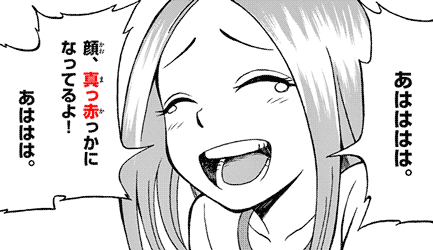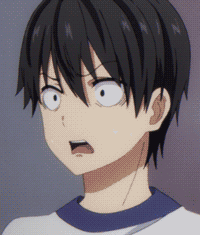In Japanese, masshiro 真っ白, makkuro 真っ黒, makka 真っ赤, and massao 真っ青 mean literally "true white," "true black," "true red," and "true blue." They're terms for strong, pure colors, but they're more commonly used with figurative meanings.
Morphology
To begin with, let's talk about how the words are composed.
First, we have the prefix ma~ 真~. The meaning of the kanji is "true," like in the word shinjitsu 真実, "truth."
Next, at the end, we have terms for colors in Japanese. They are:
- shiro
白
White. - kuro
黒
Black. - aka
赤
Red. - ao
青
Blue.
You may notice that when you combine the morphemes ma~ ま~ and shiro しろ, you don't get mashiro ましろ, but masshiro まっしろ instead, with a small tsu っ inserted in the middle.
Likewise, ma~ ま~ and aka あか turn into makka まっか, and not into maaka まあか as you'd expect. And for ao あお you get massao まっさお, not maao まあお.
These are changes of pronunciation that happen at morpheme boundary, also known as "sandhi," or ren'on 連音. They happen because it would be hard to pronounce the word otherwise. Sounds are added or changed so they become easier to pronounce.
- The same thing happens with bokukko 僕っ娘 and similar words.
The important thing to remember is that the word is massao, not "ma-ao."
Meaning
All the color words prefixed with ma~ 真~ have the basic meaning of being purer, stronger, more vivid, more intense versions of their normal variants. Basically, if shiro 白 means "white," then masshiro 真っ白 means "very white," or "extremely white" and so on.
Besides that, there's also idiomatic usage.
真っ白
The word masshiro 真っ白 means "very white," but can also mean "blank," specially in the sense of not having stains, not being cloudy, or not having anything written on it. Some examples include:
- kami ga masshiro
紙が真っ白
The paper is pure-white.
The paper is blank. There's nothing written on it.- For example, you tried to print something on the paper, but instead of getting a paper with something printed on it, you got a pure white paper sheet.
- {masshiro na} yuki
真っ白な雪
Snow [that] {is pure-white}.
Pure white snow.- Intensified color descriptions like this are often used poetically, to say something is beautiful because of how pure the color is.
頭が真っ白になる
The word masshiro can also mean "blank" in the sense of one's mind going "blank," of not thinking anything.
- atama ga masshiro ni naru
頭が真っ白になる
[My] head becomes pure-white.
[My] head becomes blank.- This is a double subject constructions with an implicit topic.
真っ黒
The word makkuro 真っ黒 means "very black." In some cases, it can also refer to someone's dark, tanned skin.
- makkuro na hitomi
真っ黒な瞳
Pupils [that] {are pure-black}.
Pitch-black pupils.
真っ赤
The word makka 真っ赤 means "very red." It often refers to someone's blushing, "red face," sekimen 赤面.
- makka ni naru
真っ赤になる
To become very-red.
To blush intensely.
- Context: Takagi 高木 sees the outcome of her teasing.
- a-ha-ha-ha-ha.
あはははは。
*laughs.* - kao, makka-kka ni
natteru yo!
顔、真っ赤っかになってるよ!
[Your] face, [it]'s turned really red! - a-ha-ha-ha.
あははは。
*more laughs.*
真っ青
The word massao 真っ青 means "very blue." It often refers to things that are beautifully blue, but it can also refer to someone's face if they look like they're feeling unwell.
- massao na sora
真っ青な空
A pure-blue sky. - massao na umi
真っ青な海
A pure-blue sea. - kaoiro ga warui
顔色が悪い
The color of [your] face is bad.
You look unwell.
Anime: Ore wo Suki nano wa Omae dake kayo 俺を好きなのはお前だけかよ (Episode 2)
- Context: Amatsuyu's face going blue with shock as he sees his worst nightmare appear before him.
Related Words
For reference, some other words starting with ma~ 真~.
- makkura
真っ暗
True darkness.
Very dark.- kurai
暗い
Dark.
- kurai
- mapputatsu
真っ二つ
True two.
Used when splitting something "into two" parts.- futatsu
二つ
Two [things].
- futatsu
- massugu
真っ直ぐ
True direct.
Refers to someone who is "sincere," direct with their thoughts.- sugu
直ぐ
Immediate.
Direct.
- sugu
- mattou
真っ当
Proper.- {mattou na} shigoto
真っ当な仕事
A proper job.
- {mattou na} shigoto
See Also
- do~ ド~
Another prefix that emphasizes things.


I guess, "ma" exists with 4 color basically because it was only 4 colors in japanese for a long time. (明暗顕漠 system). Which were kuroi, shiroi, akai, and aoi (which was almost everything that was not black/white or red).
ReplyDelete